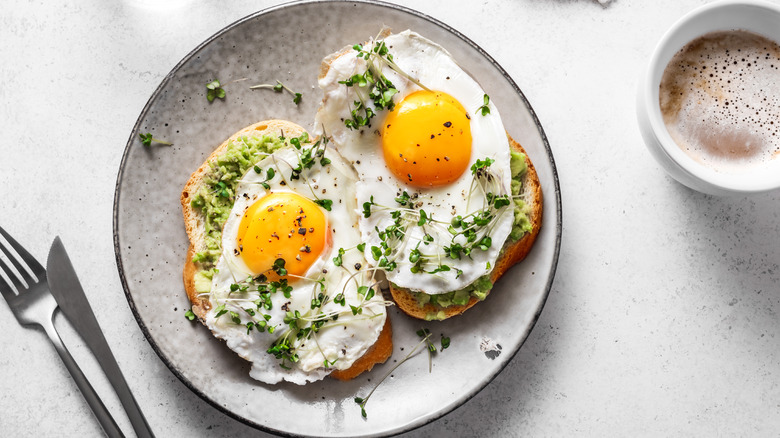Are Eggs Considered A Superfood?
Whether you break out herbs and the omelet pan or crack your egg straight into the skillet, making eggs guarantees your breakfast will fill you up. Eggs have become associated with superfoods, thanks to their health benefits. They're supposed to be hearty, healthy, and versatile if you don't mind a little dietary cholesterol. Yes, eggs have been long associated with upticks in cholesterol, so the discourse surrounding their health benefits is as free-ranging as select farm-fresh eggs. That is to say, the verdict surrounding eggs is confusing and muddled with contradictory information.
According to the Cleveland Clinic, eggs are ultimately an inexpensive, easy source of nutrients with anti-inflammatory and antioxidant properties. They're therefore often regarded as a superfood, which is defined as health-beneficial foods rich in vitamins and thought to help prevent sickness or improve personal health (via UC Davis). However, per a separate report from the Cleveland Clinic, superfoods aren't a nutritionally-recognized food category, so there are no set criteria a food must meet for this qualification.
Given these loose guidelines, the term "superfood" has been widely cited in recent years and misrepresented or over-emphasized by marketing, explains UC Davis. While certain superfoods like blueberries and oats certainly promote a healthier diet, variety and moderation remain crucial for one's well-being. It is through this lens that eggs can be declared relatively healthy, though with one cholesterol-related caveat.
Eggs don't necessarily put your heart at risk
Let's address the elephant in the room: Eggs are high in dietary cholesterol, though the implications of what that actually means may be outdated. According to the Mayo Clinic, one egg amounts contains about 75 calories. The protein and cholesterol content breaks down to about 6 grams and 210 milligrams, respectively. The yolk contains some of the highest yields of dietary cholesterol out of any food (via Masterclass). This extreme cholesterol content is commonly associated with the risk of cardiovascular disease — a correlation recent studies have questioned.
According to Insider, researchers prior to 2015 didn't fully comprehend the impact that dietary cholesterol had on cardiovascular disease. It is important to note that dietary cholesterol and cholesterol in the blood are not the same things. Given the weak relationship between the two, the "Dietary Guidelines for Americans" changed its tune in 2015 (via the Harvard School of Public Health). Recommendations to limit consumption of dietary cholesterol to 300 mg daily were rescinded, thereby overturning previous assumptions about eggs.
According to NBC News, however, the science on eggs' health benefits remains inconsistent. Multiple studies have suggested a lack of correlation between eggs and cardiovascular disease, implying that an egg a day may even decrease one's risk of stroke. Meanwhile, other research implies that high egg consumption correlates to a greater risk of heart disease and even death, drawing conclusions back to square one.
Eggs are indeed super but in moderation
These findings make it difficult to conclude if eggs are truly superfoods. So, like anything, they're best eaten in moderation. Although large amounts of dietary cholesterol don't necessarily cause a risk of heart disease, you'll still want to eat your eggs sparingly. Per the Mayo Clinic, you can eat roughly seven eggs each week without compromising your heart's health.
With or without its cholesterol, eggs remain a relatively healthy food and a great source of vitamins A, D, and B12, not to mention choline (via Mayo Clinic). According to Today, eggs are also likely to be more filling than standard carb breakfasts, quelling appetites later in the day. This effect inadvertently correlates to better heart health, as excess weight is associated with heart disease.
To keep your eggs as good for you as possible, balance them carefully. Once you start adding sides of bacon, buttered toast, and crispy potatoes, the health benefits are practically nullified. If you want to keep your eggs even cleaner, eliminate the butter or oil you cook them in. Soft-boiled or poached eggs are some of the healthiest egg iterations — and make for a super breakfast.


